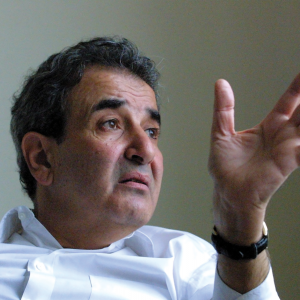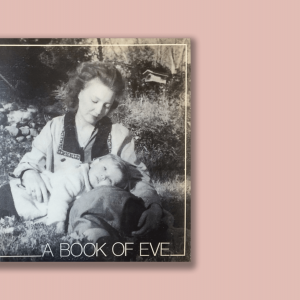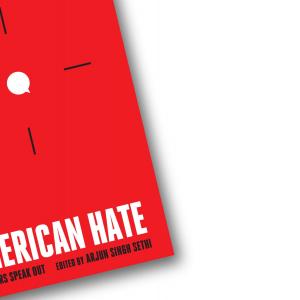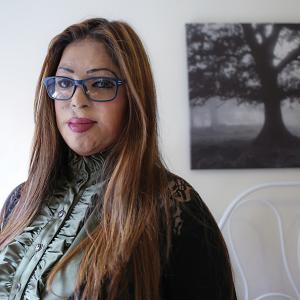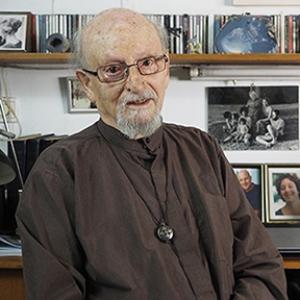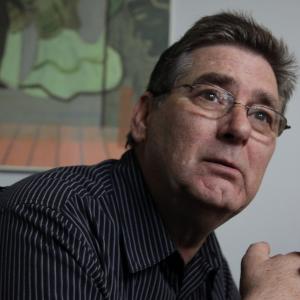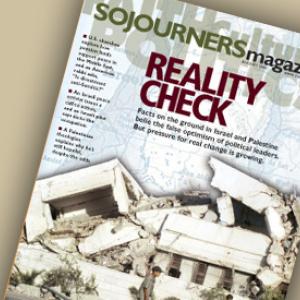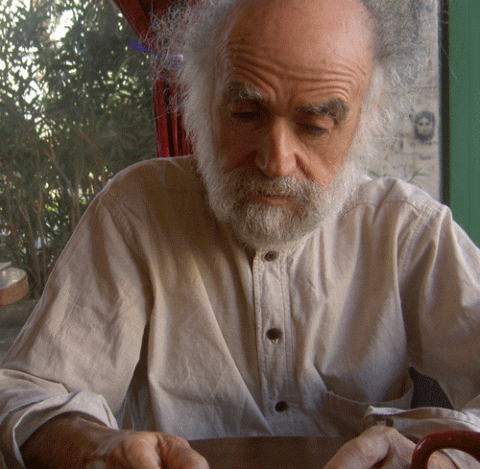
Robert Hirschfield is a poet and journalist in New York City whose work has appeared in the National Catholic Reporter, the Jewish Review of Books, and other publications. His new poetry collection is The Road to Canaan (Presa Press).
Posts By This Author
A Poetic Witness to the American Imperium
Unarguably heavy words roll easily off poet Lawrence Joseph's tongue.
HISTORY HAS PAID personal attention to Lawrence Joseph, a Maronite Catholic from Detroit. In 1967, when Joseph was 19 and just finished with his freshman year at the University of Michigan, his father’s grocery-liquor store was looted and burned during the Detroit Rebellion. The five-day uprising of Black people reacting in part to police abuse and brutality and its fierce suppression by law enforcement and the National Guard made him “acutely conscious of America’s deeply systemic violence.”
Joseph, a poet who was also a lawyer who taught at St. John’s University in Queens, N.Y., and at Princeton, was living a block from the World Trade Center in 2001 when the two planes attacked. He and his wife had to evacuate their apartment. It was weeks before they could return. In the title poem of his 2017 volume So Where Are We?, Joseph writes:
flailing bodies in midair—
the neighborhood under thick gray powder—
on every screen. I don’t know
where you are, I don’t know what
I’m going to do, I heard a man say;
the man who had spoken was myself.
A Largely Unknown Poet Dialogues With God
Poetry by Catherine de Vinck.
LIKE MOST POETS, she is largely unknown, but 97-year-old Catherine de Vinck can live with that. She has a dozen published volumes to her credit, a collection titled The Confluence of Time that she is working to publish, and the love of Christians drawn to the sometimes-shaky Jacob’s ladder of contemplation and social action. Thomas Merton was among her readers.
“Nothing stands still long enough / for us to find the first imprint / to grasp the pure moment of origin. / How then can we see the world as it is,” she writes in her poem “Ever-Changeless/Even-Changing.”
Poet Robert Lax Still Leads Us Into the Holiness of Silence
Honoring the poet who always left space for grace to flow.
IN 1948, A HERMIT was made known to the world by another hermit. Like many Christian holy men, the Jewish-born Catholic contemplative and poet Robert Lax had his early spirituality enshrined in a book: The Seven Storey Mountain, the bestselling autobiography authored by his friend, the Trappist monk Thomas Merton.
“He had a mind naturally disposed from the very cradle to a kind of affinity for Job and St. John of the Cross,” Merton wrote about Lax. “And I now know that he was born so much of a contemplative that he will probably never be able to find out how much.”
Better known to many for what was written about him than for what he wrote (and he wrote a lot), Lax, who died in 2000 at age 84, wanted, according to his archivist Paul Spaeth, “to put himself in a place where grace can flow.” For Lax in the 1940s, New York City was not such a place. Though he worked with the poor at Baroness Catherine de Hueck’s Friendship House in Harlem, and had enjoyed jazz with Merton, he balked at the gaspingly fast pace and materialism of the city. He was also unhappily employed at The New Yorker.
Targeted for Who They Are
'American Hate: Survivors Speak Out,' ed. by Arjun Singh Sethi. The New Press.
IN HIS INTRODUCTION to American Hate, Arjun Singh Sethi warns readers: “The pages that follow are not for the faint of heart, but neither is this moment.”
The hate crime survivors he spotlights speak with the stunned, searching voices of aggrieved neighbors: Syrian Muslims, Sikhs, Lebanese Christians, African Americans, Southeast Asians, Jews, and Native Americans. Sethi, a 37-year-old Sikh lawyer from Washington, D.C., shatters the complacent notion that hate crimes in the U.S. target only Muslims or unlucky Sikhs mistaken for Muslims.
Sethi’s book is evidence of the current civic plague of top-down moral dysfunction. President Trump, he writes, while “exercising the worst form of bully pulpit,” has “emboldened, empowered, enabled, facilitated, and legitimatized the very worst in America: racism, xenophobia, Islamophobia, sexism, anti-Semitism, homophobia, transphobia, ableism, and anti-immigrant hostility.”
Fighting Back with Style
She survived an attack with acid. Her revenge? Working against gender violence.
“I JUST TURNED 19 that April, the age a girl blossoms. I was attractive. I was a fashion student in Delhi. Two months later, driving my car in Lucknow, just like that, I was cooked, finished!”
Now 30, Monica Singh, throws back her head, with its reconstructed face, the product of 46 painful operations, and laughs with real gusto at this unseemly cosmic joke. I find myself, uneasily, laughing with her.
We are sitting in Gregory’s Coffee near Times Square in New York City. It is a January evening. The café is nearly empty, and the overhead lighting seems to be struggling to push back the darkness pressing in against the window. Singh is unfazed by this Hopperesque tableau.
In the weeks after her spurned suitor hired men to pour a bucket of acid over her, she was confined to a cage-like cubicle to protect her from infectious contact. “It was like being in a coffin,” she said. “People were looking at me from a distance. I felt like an animal in the zoo. But in my mind, I was already walking, going back to school, imagining that I didn’t open my car door to the men on the bicycle, that I didn’t leave the house that day.”
Lyrics and Litanies
The poetry of Parneshia Jones bears witness to the past and the present.

Panya Anakotmankong / Shutterstock
We are the long grass and anxious wind,
the generations, speaking softly, between
the lines of history.
IN THE POEMS OF PARNESHIA JONES, 35, the lines of black history that angled north from the Deep South after the First World War empty into the bruised and tender histories of family and community.
The lines above are from “Legacy,” one of the poems from her first collection, Vessel (Milkweed Editions), dedicated to Evanston, Ill., Jones’ hometown, and the home of Shorefront, the organization that documents black lives on the North Shore of Chicago.
“I had a lot of storytellers around me growing up,” Jones tells Sojourners. “My grandmother was a storyteller, my grandpop was a storyteller. I was always the youngest of the group, so I was trained to listen. When you listen to everyone else, you carve out a space to listen to yourself. Young poets should listen more to their families, to the voices they heard growing up.”
The poet says she was raised in her grandfather’s juke joint. He migrated north from Mississippi. Her first dog came from Gypsies who hung out outside his clubs.
Jones’ voice, even when banked by the din of a mid-Manhattan restaurant, is soft, leisurely. Telling her story, she will not be hurried. Her story begins with a portentous name, the spawn of chance.
The Living and the Unforgotten
Tuvia Ruebner is one of Israel's poets of witness.
TUVIA RUEBNER HAS earned the lament he wrote for King David, Israel’s better-known sorrow bearer. The poet came into the world 91 years ago in Pressburg-Bratislava, Slovakia, under Nazism’s shadow. It is a shadow he managed to separate himself from physically, but which sticks to him philosophically and is at the core of his poetry. The parched sound of random loss is the root sound in many of his poems. The spawn of an unimaginable yesterday, Tuvia Ruebner is more than anything a poet of today.
His parents, his grandparents, and his little sister Litzi all perished at Auschwitz in 1942, a year after he immigrated to British Mandate Palestine. Forty years after their deaths, Ruebner’s first son, Moran, was sent to fight in Israel’s first Lebanese war. Moran left for South America the following year, estranged from his country and its wars, and after a few letters, was never heard from again.
In Ruebner’s poem “[My father was murdered],” one by one he enumerates his losses:
Redemptive Verses
Poet and Vietnam vet Bruce Weigl writes of war and reconciliation.
POET BRUCE WEIGL inhabits two places in his life, in his work. Two places that could not be more different. But in the course of our conversations, I come to think of them as a single place, the way two hands are part of a single body. One place is Lorain, Ohio. The other is Vietnam.
Ever since the Vietnam War ended, the life of this mill worker’s son has swung between those two far-flung poles.
I met Weigl at a Starbucks in Manhattan’s East Village. I was interviewing a friend of his, Adrie Kusserow, about her book of poems on South Sudan. Weigl was content just to drink his coffee and listen to us talk. He intervened only once, when Kusserow and I began decrying public indifference to South Sudan’s pre-independence history of slaughter, enslavement, and banishment by Sudan.
“If I may defend my fellow human beings here, there are so many places in the world today where there is suffering. It is understandable that people may miss one or two,” he said.
The suffering of the Vietnamese, and of soldiers like himself who fought in Vietnam, is still burned into his psyche like some gory tattoo. It is to be found in every one of his 13 books.
Protest and Praise
"Denise Levertov: A Poet's Life;" "A Poet's Revolution: The Life of Denise Levertov"
IT IS FITTING that The Collected Poems of Denise Levertov (New Directions) begins with “Listening to Distant Guns,” written in 1940, when the poet was just 17: “The low pulsation in the east is war.”
The subject of war and its horrors, a constant in Levertov’s poetry and in her life, surfaces for the final time at the very end of this big book with these lines, written in 1997, from the poem “Thinking About Paul Celan”: You / at last could endure / no more. But we / live and live, / blithe in a world / where children kill children.
Denise Levertov (1923-1997), an American poet born in Ilford, England, to a Christian-Jewish father who was a descendant of Rabbi Schneur Zalman, founder of Chabad Hasidism, and a Welsh-Christian mother, herself the descendant of the Christian mystic Angell Jones of Mold, began to see her spiritual sensibility take a more formal religious shape only in her late 50s, when she opened to the liturgical, mystical, and social justice dimensions of Christianity, especially Catholicism, to which she later converted.
Two recent biographies, Dana Greene’s Denise Levertov: A Poet’s Lifeand Donna Krolik Hollenberg’s A Poet’s Revolution: The Life of Denise Levertov, explore deeply, albeit with inevitable overlap, the serial passions and enduring poetics of this singular artist.
At age 11, both biographers tell us, Levertov was going door to door peddling The Daily Worker in Ilford. At 12, she sent a batch of her poems to T.S. Eliot, and received back from him an encouraging response.
Poetry was her life’s purest passion. She had many lovers, many headlong, hurtful affairs to compensate for her romantically derailed and failed marriage to writer-activist Mitch Goodman. She also had a troubled relationship with their son, Nikolai, to whom Collected Poems is dedicated.
A Spirituality of Solitude
Marking the centennial of pacifist poet William Stafford
Miles of yellow wheat bend; their leaves / rustle away and wait for the sun and wind.
—From “A Farewell, Age Ten”
We wondered what our walk should mean, / taking that un-march quietly; / the sun stared at our signs—"Thou shalt not kill.”
—From “Peace Walk”
WILLIAM STAFFORD was a poet of the land and a conscience that fanned out over the land. Born in Hutchinson, Kan., 100 years ago—on Jan. 17, 1914—it was perhaps his early intimacy with space and sky that opened him to the mystery of human frailty.
At age 6, he saw two black students at his school being taunted by whites. He stood with them.
Another mystery: He who personifies the term national poet is largely unknown in his nation. Four new books (in his 79 years, Stafford published more than 50 books) published to coincide with his centennial might help redress this situation. Ask Me (Graywolf Press), from which the above excerpts are taken, brings to readers 100 “essential” Stafford poems dealing with his pacifism, his family, Native Americans, and the landscapes of his native Kansas and his adopted Oregon, where many centenary events are scheduled to take place.
God 'Beneath the Ordinary'
The universal vision of Hasidic poet Yehoshua November
I MEET Yehoshua November in an empty classroom in Touro College in Brooklyn, N.Y., where he teaches. The chairs and desks are piled to one side, like a barricade. We sit in a clearing beside the clutter, talking about his place as the only Hasidic poet—he is a 34-year-old member of the Lubavitch sect—on the American literary landscape, an entity ruled largely by secular academics far removed from the realities and sensibilities of ultra-orthodox Jewish observance and mysticism.
“They are the rabbis of poetry,” November laughs. He laughs so hard he doubles over in his chair. His laughter is as strange as it is infectious. Yet in all of God’s Optimism, his book that was short-listed for the 2010 LA Times Book Prize, there is not a single laugh line. His poems are serious, if lightly held narratives, some parable-like, most down to earth with a longing for heaven.
“Poetry is their vision of spirituality, their own religion, and they don’t want traditional religion brought in,” he says.
Even November’s long, reddish beard seems delighted at their rebellion against traditional religion. An antinomian Hasid and unashamed of it.
When I first read God’s Optimism, the poem I kept going back to was “Baal Teshuvas at the Mikvah” (baal teshuvas are secular Jews who return to religious observance), a poem of solidarity with those intimate others who came to Hasidism through the tunnel of the profane, commonly marked by drug use and sexual looseness, for the sake of spiritual passion held within a net of restrictions.
Homeless, Not Helpless
In New York City, an activist group of homeless and formerly homeless people challenges the powers that be.
THE RED, RUN-DOWN, two-story frame house on Morris Avenue in the West Bronx that houses the Picture the Homeless offices looks much like those around it, except for the organization’s blue banner that hangs from the porch. The youths (there are older members too) who log in to their homeless blogs and look for jobs on the computers upstairs, surrounded by images of Zapata and the Selma freedom marchers, are mainly black and Latino, and they could be almost any of the young people you see on the street. Picture the Homeless is seamlessly embedded in this New York City neighborhood, where the new poor from Africa and South Asia join the long-established poor from Puerto Rico and the Dominican Republic.
Picture the Homeless (PTH) combines social action, advocacy, outreach, and community and is run almost exclusively by homeless and formerly homeless New Yorkers. The organization’s name references the importance of challenging widespread stereotypes about people who are homeless. “Don’t talk about us; talk with us” is a PTH slogan, and it claims as a founding principle that “in order to end homelessness, people who are homeless must become an organized, effective voice for systemic change.”
Kendall Jackman, in her 50s, one of PTH’s housing organizers, lives in a women’s shelter not far from Morris Avenue. The former postal worker from Brooklyn’s Bed-Stuy neighborhood—“No matter where I live, I will always be a Bed-Stuy girl,” she said—lost her housing two years ago when the building she was living in was foreclosed on.
“Of the 72 women in my shelter, 69 of us either work or go to school,” Jackman said. “With no low-income housing available, shelters are now the homes of the working poor.”
Prayer, Poetry, Politics
Orange Alert: Essays on Poetry, Art, and the Architecture of Silence. And, Fasting For Ramadan: Notes from a Spiritual Practice.
American Spring?
Finding connections between the past, present, and future at Occupy Wall Street.
